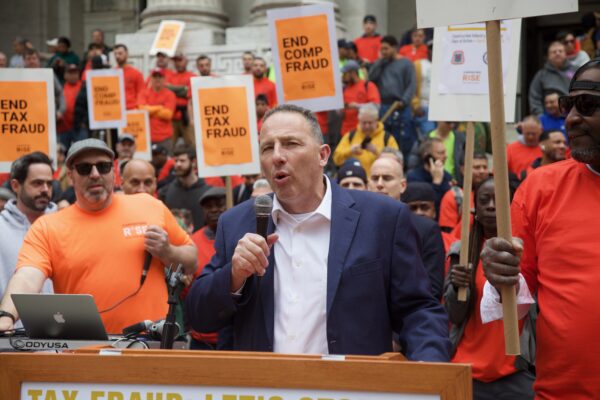April 14, 2015
By Marc Bussanich
New York, NY—Some of Rock 'n' Roll’s and Motown’s legends gathered at SAG-AFTRA’s offices on Broadway to join Congressman Jerrold Nadler’s introduction of the Fair Play Fair Pay Act of 2015, which would update music licensing rules so that musicians and songwriters receive the full value of their work when their songs are played on AM/FM, Internet and satellite radio.
In the accompanying video, we interviewed Ted Kalo, executive director of the musicFIRST Coalition, a broad coalition including musicians, artists, songwriters and organized labor that explained how the legislation would benefit content creators.
“Fundamental inequities exist in the music licensing system. For someone who isn’t an expert, you can listen to the same song on Internet radio, satellite radio and AM/FM radio. If you’re hearing the song on Internet radio, the artist might be getting fair market value; if you’re listening to it on satellite radio, they’re getting below market pay; and if you’re listening to it on AM/FM radio, they’re not getting paid at all. This bill is about changing that so that music creators get fair pay on all radio platforms,” said Kalo.
Kalo noted that existing licensing rules have been cobbled together over the decades based on “outdated technology, special interest deals and grandfathered exceptions.” The legislation, in turn, would establish a uniform market value royalty standard for all music services, irrespective of the technology platform, i.e., Internet, satellite and AM/FM radio.
Some of the veteran musicians that stood alongside Kalo and Congressman Nadler included Abdul “Duke” Fakir, the surviving member of the Four Tops, Cyndi Lauper, Elvis Costello, Nona Hendryx and Martha Reeves.
We asked Kalo that many music fans might be flabbergasted to know that musicians are being underpaid due to the current licensing system because some of the aforementioned artists have had long and lucrative careers. But he said there’s a difference between writing a song and singing one.
“The person who writes the song gets paid wherever the song is played—Internet radio, satellite radio and AM/FM radio. The person performing the song doesn’t. So when you hear Aretha Franklin’s song “Respect” she doesn’t get a penny every single time you hear that song on AM/FM radio, but Otis Redding does because he wrote the song. The problem is that big corporate radio chains like Clear Channel and Cumulus Broadcasting want to hide behind small broadcasters and claim they’ll be put out of business [by this proposal]. But this is about protecting small, local community radio and college radio—making sure they’re not hurt by this proposal. But the big radio chains with revenues over $1 million should start paying fairly,” Kalo said.
@marcbuss marc@laborpress.org



